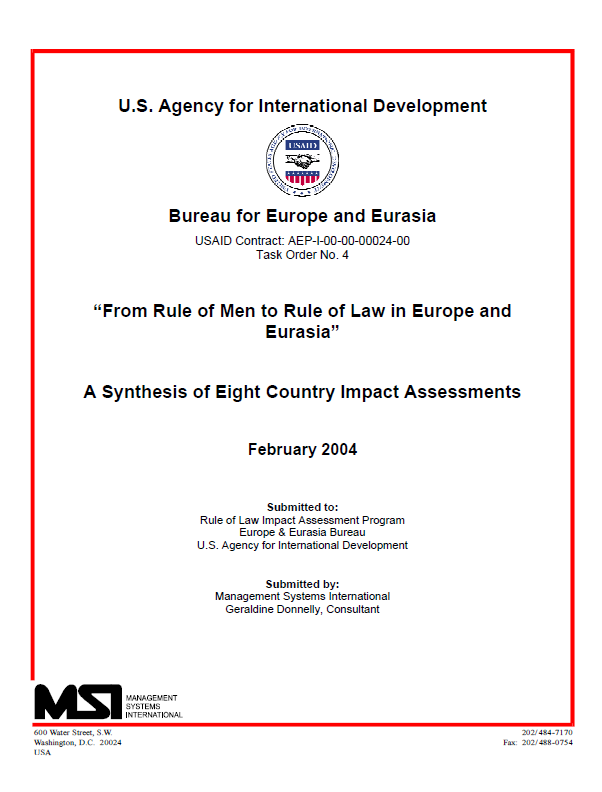Speeches Shim
More than a decade later, it is hard to remember the euphoria that greeted the fall of the Berlin Wall and the implosion of the Soviet Union. Many saw that period as an opportunity to create free market democracies where none had existed before. It was the duty of the Western democracies to diagnose for these countries the error of their Communist ways, to graft onto their political, economic and social structures the lacking elements of free market democracies, and then to step back as the patients rapidly began to recover.
Events in Eastern Europe and the former Soviet Union generated enormous U.S. support. Huge amounts of funding were provided from both U.S. government and private sources. New institutions were created to address the needs of these countries. Amid the chaos of the early years, USAID (which had no institutional experience in the region) sought to create rule of law programs that balanced hard-headed analyses of country needs with domestic and international pressures. In many countries, and in many respects, USAID and other donor-financed rule of law programs have begun to transform the legal structures of these societies in significant ways. The reality that many of these efforts have yet to produce broader impact derives from some key factors: too little early attention to the civil law traditions of the countries involved; misunderstanding of the motives of key “reformers”; underestimation of the power of vested interests in resisting reform; and less than keen understanding of how post-Communist power structures, coupled with economic collapse, could give rise to strongmen, oligarchs, mafias, and other shadowy elements, whose emergence would significantly dampen individual countries’ abilities to embrace democratic ideals and market reforms.
The Western concept of rule of law grew out of centuries of efforts by mostly European or Eurocentric thinkers to level the playing field for citizens of monarchies, empires and republics. It sought to create a social contract between the government and the governed on the rules of political, economic and social interaction, and to provide checks and balances on the exercise of power within the country. Viewed through this historical prism, it should not be surprising that the majority of countries assessed have not come very far along the spectrum from “rule of men” to “rule of law.” Their great upheavals are too recent and, in many cases, still in progress. Independence and/or freedom from the Soviet orbit have unleashed forces, e.g., ethnic strife, the “grabbing” of national assets by well-connected oligarchs, which complicate their trajectories. The citizenry is cynical, focused on day-to-day economic struggles, badly informed and often apathetic about how the rule of law underpins market democracies.
In early 2000, the Bureau for Europe and Eurasia (E&E) initiated development of a new strategic framework for democracy and governance (DG) programming for the coming decade, including an in-depth look at the assistance challenges in each of the principal sub-sectors of E&E DG assistance (civil society, political processes and elections, media, rule of law and local government). With respect to the rule of law (ROL), it quickly became obvious that few formal evaluations or assessments had been done, either by USAID or other donors. A decision was made to carry out impact assessments of past rule of law programming in selected countries to facilitate cross-country comparisons and identify key lessons for program strategy and activity development over the next decade. Each country assessment ultimately focused on a set of programs and issues mutually agreed upon by E&E, participating missions and assessment teams.
Of the countries assessed, only in Bulgaria where, after many twists and turns, the government and the populace now seem committed to the changes necessary for EU accession, is there hope for increasingly rapid adoption of the rule of law. Even there the path is unlikely to be smooth. Bulgaria’s experience (as well as that of other Central and Eastern European countries which have moved more rapidly along the rule of law spectrum) seems to suggest that even countries with relatively little recent history or experience of independence, democracy and capitalism can be drawn along faster by the carrot of European integration. Where prospects for full European integration or other similarly strong incentives are lacking, progress is much slower and much more difficult.
This synthesis of the eight country assessments is designed to identify and analyze common experiences in designing and implementing ROL strategies and programs, and to draw some conclusions as to which factors contributed to program impact or lack thereof. It also looks at the impact and effectiveness of particular types of ROL programming. Unlike conventional evaluations, the individual country assessments did not directly assess the performance of agency activity designers and managers or activity implementers, be they contractors or grantees. Rather, the assessments focus on what was done, with what results, what worked or didn’t work, why, and how future efforts can be developed, sequenced and implemented more effectively to enhance future impact.
To facilitate comparisons, assessment findings are organized by the three major categories of ROL assistance: developing and implementing the legal framework, developing and/or assisting legal institutions, and law and civil society.


Comment
Make a general inquiry or suggest an improvement.